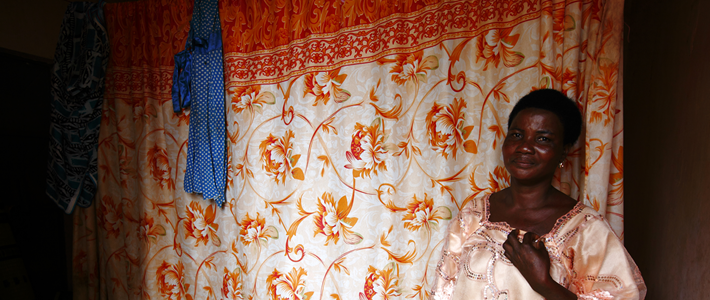
My name is Ama Kidiba. I am 44, HIV-positive and divorced, and I have a family of three children: two girls and a boy. The first two years after I discovered that I was HIV-positive were tumultuous times… the shock, the abandonment by my husband, the insults and the total rejection by my mother and my sisters, and then my isolation.
I used to sell cereals and live together with my husband. We didn’t have children. So, my husband asked me to get pregnant from another man. In this way, he would preserve his honour and family pride. Despite my reluctance, I was forced to do this. Two children were born from this extramarital union. The paradox is that my husband took great care to register these children and to give them his name. He asked me to cut all ties with the real father of the children, which I did.
Three years later, a miracle happened. I was found to be pregnant a third time and, this time, it was my husband’s child. We were happy. As per normal practice, I underwent clinical tests, including one for HIV. When I was asked to go to get my results, the midwife told me to bring my husband along. He categorically refused to join me, asking why he needed to be there, once he was not asked to be present when the previous results were revealed. The next day, I went to the midwife, who pronounced the sentence I will never forget: “Madame, you are HIV-positive, which means that you have the virus that causes AIDS.” This was in 2004. “I have the sickness of the century, the sickness of shame and death.” On the way home, I was haunted by the words of the midwife and by so many questions without answers.
Back home, my husband didn’t take the news well. He called my mother from our village, 450km away, and they called me a prostitute and a witch. My husband repudiated me and my two older children. When he was drunk, he was a cause for scandal in the neighbourhood, submitting me to humiliating and degrading treatment in public. My mother and my sisters rejected me. These were moments of agony. I was still in the first trimester of my pregnancy. My husband refused to get tested and took a new wife.
After the birth of our daughter, I managed to start working in my business again, with great difficulty. I was alone and abandoned, and the burden of education and care of my children lay on my shoulders alone. My health had become fragile and my CD4 count was very low. I was put on antiretroviral treatment. Psychologically speaking, I was beaten. I had no more hope. I had nowhere to go and no one to trust. I was subjected to gossip and rejection by all, including my family. The desire to kill myself haunted me.
I was like this until the end of 2009, when a friend with whom I took ARVs told me about a centre that was run by the Jesuit priests, where monthly meetings were held. This is how I discovered the Centre Espérance Loyola (CEL – Loyola Hope Centre). Thanks to the warm welcome and empathetic listening that I received in those early days, I got my glimpse of a ray of hope. I took part assiduously in the meetings of psychosocial accompaniment.
Since then, I have found a new family, a space of peace where I can flourish, with new challenges. Briefly, it is my new home of hope of life. All my problems have been taken to heart, right up to this day. Each time a new term starts, my children receive plenty of help: school kits, tuition fees, food, and they are part of a support group for children throughout the year. They are also followed through school, and given counselling and advice as needed.
As for me, my health has stabilised and I have started to live positively with HIV. Recently, so that I may become more self-sufficient, the CEL extended mini-credit to me, for my work of selling vegetables. I hope to get more credit and support from the CEL to expand my activities and also to be able to guarantee an education and a future for my children. Thanks to the support of the CEL, I have my life back on track, and I am flourishing.

